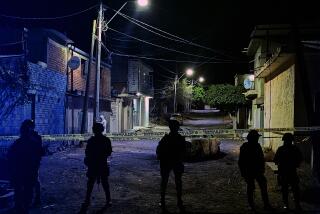For BP, oil spill is a public relations catastrophe
Seeking to blunt criticism of its emergency response, British oil giant BP vowed Friday to harness all of its resources to battle the Gulf of Mexico oil spill as the company worked frantically to stay ahead of the growing disaster and the blow to its carefully manicured image of environmental responsibility.
Louisiana and federal officials said BP’s efforts so far were “not adequate” and that the London company should do more — even with help from competitors — to contain the approximately 5,000 barrels of oil leaking each day after last week’s sinking of the oil rig Deepwater Horizon.
On Friday, BP mounted a spirited defense of its work to seal the leaking oil well and contain the spill, which could surpass the 1989 Exxon Valdez disaster in Alaska’s Prince William Sound as the worst in U.S. history. BP is the majority owner of the oil field and, with its partners, is spending about $7 million a day on the problem while BP’s falling stock price has sliced about $25 billion from the company’s market value.
“We are determined to fight this spill on all fronts, in the deep waters of the gulf, in the shallow waters and, should it be necessary, on the shore,” said BP Group Chief Executive Tony Hayward, echoing Winston Churchill’s famous World War II speech proclaiming: “We shall fight on the beaches, we shall fight on the landing grounds, we shall fight in the fields and in the streets.”
Hayward has much to defend. In recent years, BP has spent heavily to position itself as an environmentally friendly company, redesigning its logo into a green-and-yellow sunburst and advertising its $4-billion alternative-energy push to move “beyond petroleum.”
In addition, BP has been plagued by safety problems, including a March 2005 explosion at BP’s Texas City refinery, which killed 15 workers and injured about 170.
Hayward became CEO three years ago and has worked hard to restore the company’s public image. This week, after an initial bobble in which the company downplayed the size of the leak at about 1,000 barrels a day, BP appeared to be doing many things well to avoid outrage, down to framing itself as an ally fighting against a common enemy, experts said.
The CEO was “putting BP on our side. Trying to engage us against this enemy — the spill — is probably one of the better ways to manage this much bad news. It’s clever framing,” said Adam Hanft, an expert on marketing and business strategy whose firm, Hanft Projects, has advised several Fortune 500 companies.
Phil Weiss, a senior analyst at Argus Research, said Hayward and BP were doing the right thing by throwing a lot of resources at the spill and “saying that they will accept all of the help they can get. It looks like they are trying to do everything they can.”
But oil analyst Fadel Gheit of Oppenheimer & Co. said the spill could be easier to control than the company’s image. BP has a reputation in the industry as an aggressive company tackling the deepest and most difficult oil prospects.
“It’s a public relations disaster,” Gheit said. “Hayward has worked so hard to right the ship over the last three years, and now this. Everything he did is now meaningless.”
Far less visible has been the Deepwater Horizon’s owner, Transocean Ltd., a giant in the oil exploration industry but far less well known to the general public.
Transocean is “the world’s largest offshore contract driller, and we have the largest presence in all asset classes. We are in fact more than twice the size of our nearest competitor, and we operate in all the significant offshore markets worldwide,” Ricardo H. Rosa, company senior vice president and chief financial officer, said in a presentation to investors earlier this year.
At the time, the company boasted that it was in so much demand that it had a backlog of contractual commitments collectively worth $31 billion, equivalent to roughly two and a half years’ activity.
Analysts said repercussions from the accident could be enormous.
“While we expect that deepwater activity will be allowed to continue,” Weiss said, “we do not know how this incident will impact such activity going forward.”
More to Read
Start your day right
Sign up for Essential California for news, features and recommendations from the L.A. Times and beyond in your inbox six days a week.
You may occasionally receive promotional content from the Los Angeles Times.







